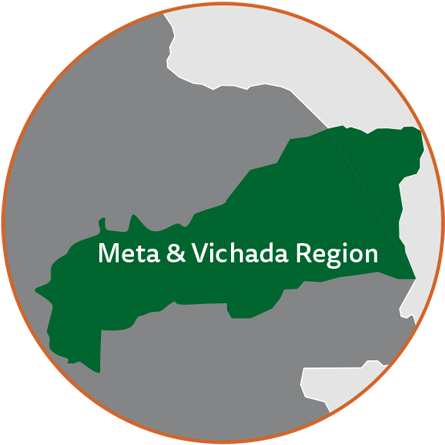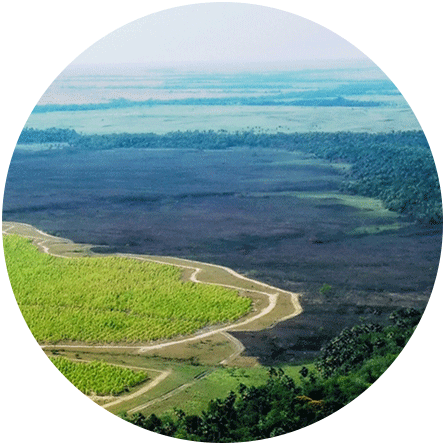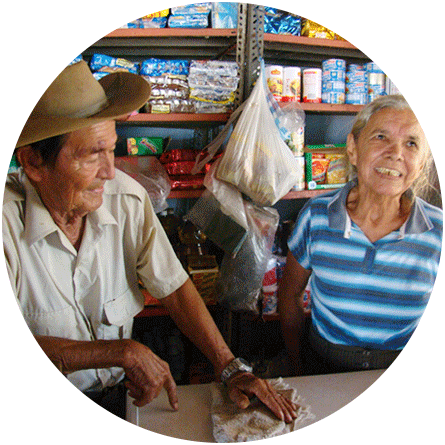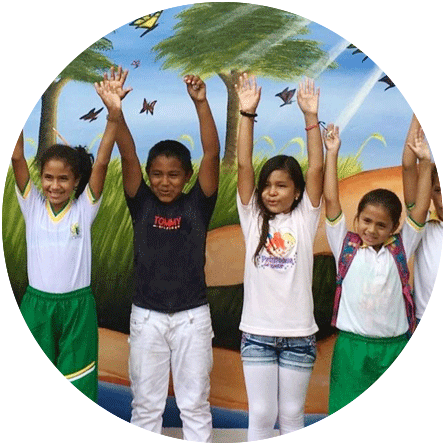
A Commitment to Colombia
To ensure our operations have a positive impact geographically, we embarked on an extensive due diligence process to select a region. Both we and our stakeholders felt confident this would result in an overall betterment of the region due to the establishment of a sustainable plantation forest. After an exhaustive process, the Vichada region of Colombia was identified and selected as an ideal location for several reasons.
Expansive Degraded Lands: Opportunity for Land Stewardship
The total area of Vichada is just over 100,000 km2 (10 million ha), which is primarily classified as degraded grasslands. These lands have historically had little to no productive use. Local farmers have used it for grazing a few head of cattle, but due to a lack of a sound management system, they are suffering, and cattle farming has decreased considerably. Residents purposely set uncontrolled grassfires over vast areas to clear out the existing grassland and to encourage the growth of new grass. These destructive burning practices further degraded the land. Overhunting was also widespread.
FFC saw the potential to improve these lands through plantation forestry operations and effective land stewardship practices. To date, we have 16,151 planted hectares, representing 40% of our total area. Of the remainder, 12% is designated for future plantings, 21% is under study, and 6% is set aside for infrastructure and other uses.
Management of these conservation areas provides FFC with the opportunity to protect the biodiversity of the region. Grasslands in this region are not under threat as the Llanos ecoregion roughly comprises an area of 570 000 km2, 3% of South America’s surface area. However, deforestation is a concern in the Amazon region and is recognized as having a significant impact on biodiversity in Colombia.


No Indigenous People or Cultural Heritage Sites
There are no indigenous people located in the area. In the region, the indigenous populations are migratory and relocate on a regular basis across the area. The indigenous people do not have a claim or a relationship to the land on which we operate.
Research revealed that our operations would not adversely impact non-replicable cultural property (e.g. archaeological, historical, or religious sites), sites with unique natural values or intangible cultural heritage (e.g. social practices, rituals and festive events). All sites of cultural significance were identified and mapped to ensure protection and access before operations commenced. These sites were recorded within the GIS system in our forestry management software, to ensure operations do not affect them in the short or long term. Where these are identified in the future, specific management plans will be drawn up with the local community to ensure that they are protected and managed in accordance with the local wishes and requirements.
Opportunity to Improve the Biodiversity in the Region
As part of FFC’s due diligence, we undertook a risk assessment to determine if our operations would infringe on high conservation/biodiversity value areas (HCVA). This Environmental and Social Impact Assessment (ESIA) revealed that the area of operations has limited HCVA, which we can then protect, and it identified that we should not expand our operations south of the Bita River. This assessment revealed an opportunity for FFC to play a meaningful role in protecting and preserving biodiversity in this area.


Opportunity for Social and Economic Development
The Vichada region is one of Colombia’s most impoverished regions, having the second lowest GDP per capita, less than half of Colombia’s national average. 45% of Colombia’s countryside population lives in poverty (19% living in extreme poverty). Colombia experienced 53 years of civil conflict, which has resulted in displacement and diminished employment opportunities. This region has not previously had a legal, commercial, or industrial framework for employment and has subsisted in an informal environment.
FFC presents the first large scale economically viable and legal enterprise in the region apart from cattle farming. This provides us with the opportunity to make a positive difference in this region through social and economic development initiatives.
